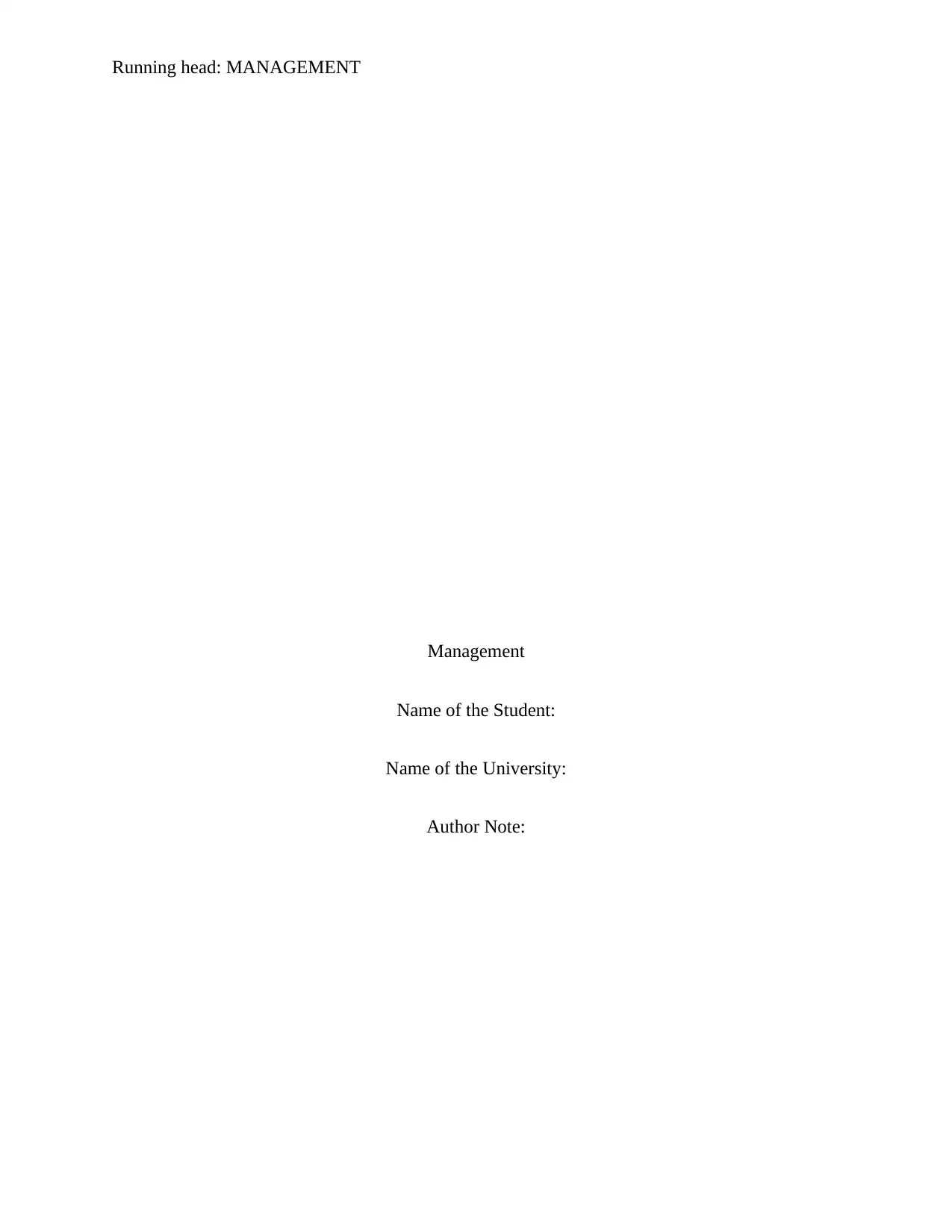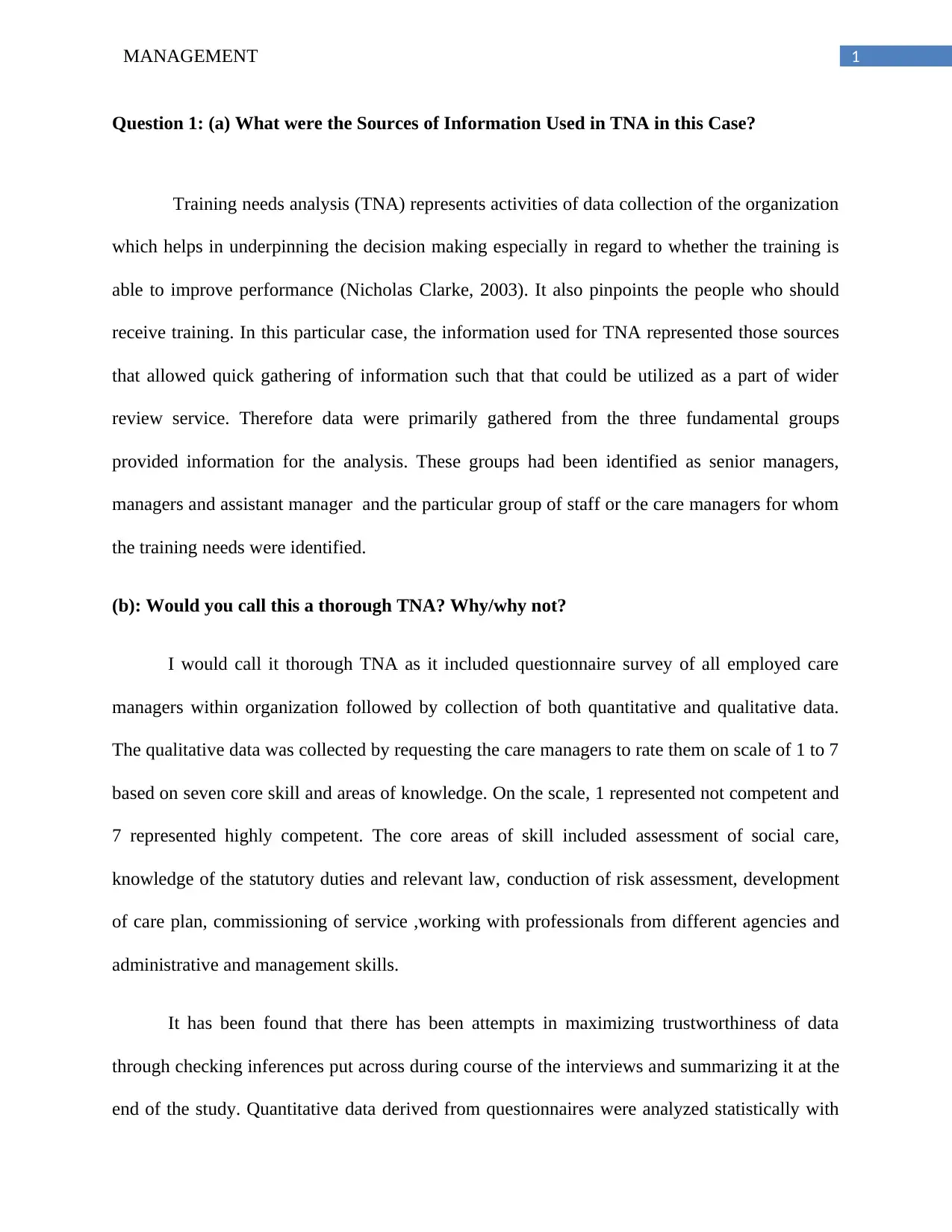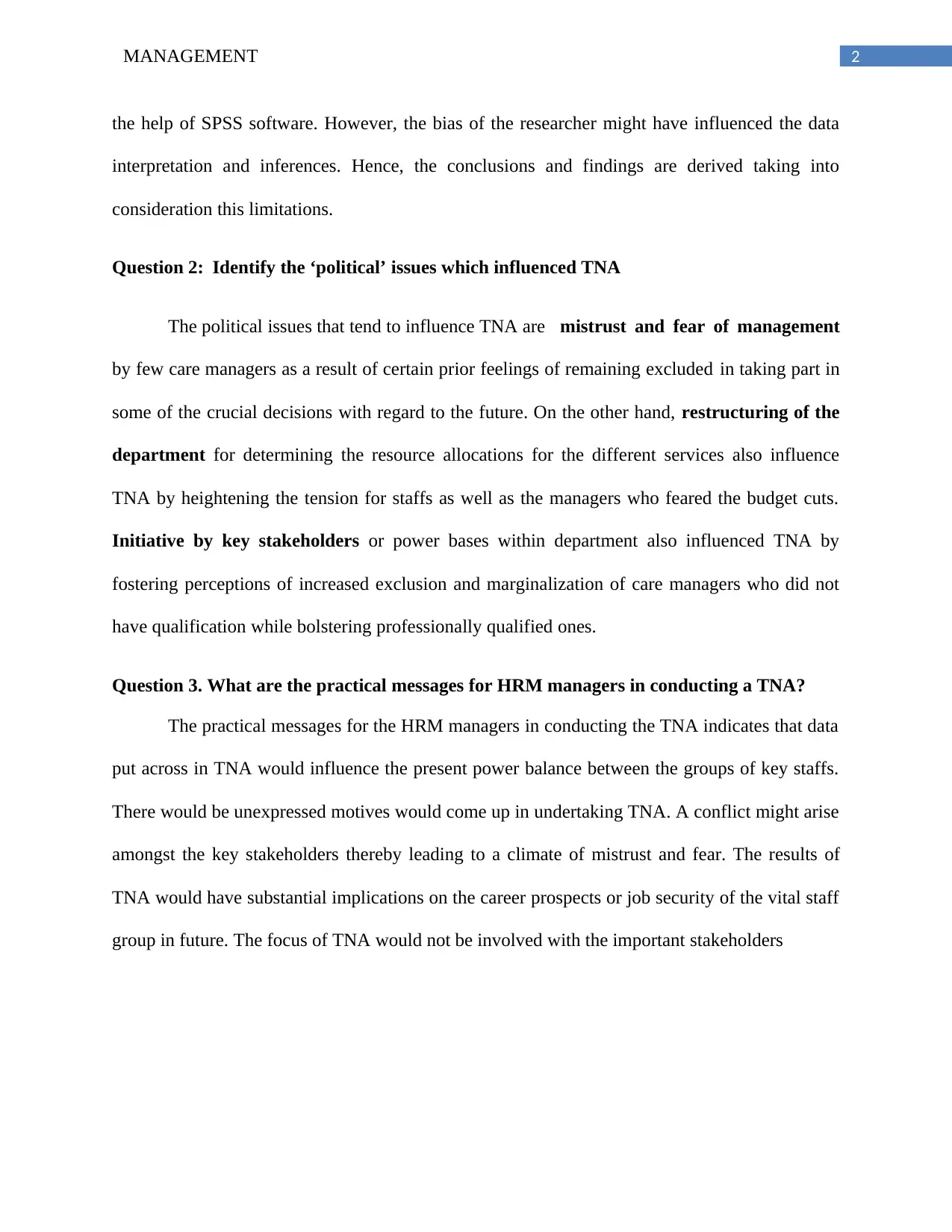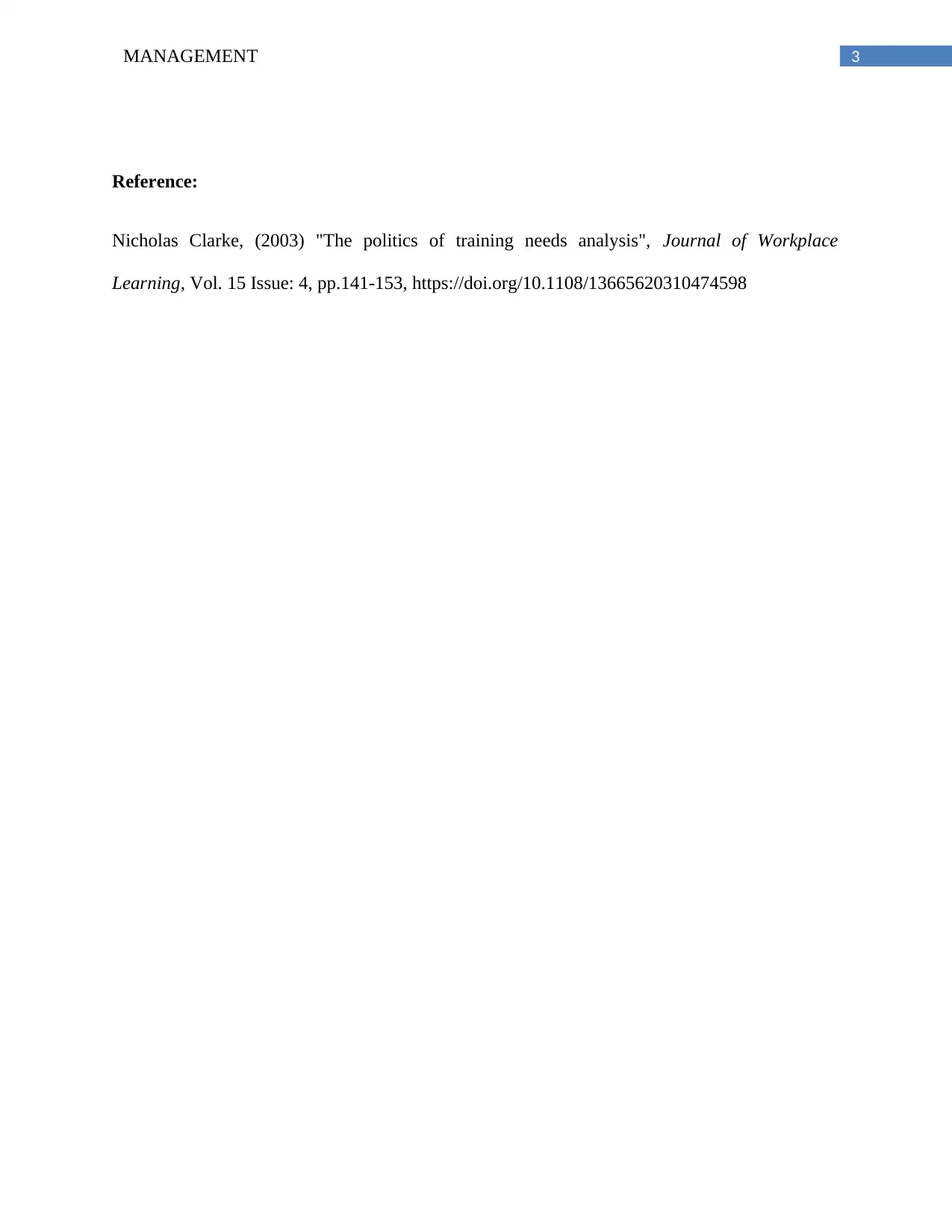Management: Training Needs Analysis Homework Solution
VerifiedAdded on 2022/08/21
|5
|655
|17
Homework Assignment
AI Summary
This assignment analyzes a case study on Training Needs Analysis (TNA), addressing the sources of information used, the thoroughness of the analysis, and the political issues influencing the process. The solution evaluates the TNA's methodology, including the use of questionnaires and statistical analysis, while also acknowledging potential biases. It identifies political factors such as mistrust, fear, and departmental restructuring as key influences. Furthermore, the assignment provides practical messages for HRM managers, emphasizing the impact of TNA data on power dynamics, potential conflicts, and employee career prospects. The analysis draws on the provided journal article by Nicholas Clarke to support its conclusions.

Running head: MANAGEMENT
Management
Name of the Student:
Name of the University:
Author Note:
Management
Name of the Student:
Name of the University:
Author Note:
Paraphrase This Document
Need a fresh take? Get an instant paraphrase of this document with our AI Paraphraser

MANAGEMENT 1
Question 1: (a) What were the Sources of Information Used in TNA in this Case?
Training needs analysis (TNA) represents activities of data collection of the organization
which helps in underpinning the decision making especially in regard to whether the training is
able to improve performance (Nicholas Clarke, 2003). It also pinpoints the people who should
receive training. In this particular case, the information used for TNA represented those sources
that allowed quick gathering of information such that that could be utilized as a part of wider
review service. Therefore data were primarily gathered from the three fundamental groups
provided information for the analysis. These groups had been identified as senior managers,
managers and assistant manager and the particular group of staff or the care managers for whom
the training needs were identified.
(b): Would you call this a thorough TNA? Why/why not?
I would call it thorough TNA as it included questionnaire survey of all employed care
managers within organization followed by collection of both quantitative and qualitative data.
The qualitative data was collected by requesting the care managers to rate them on scale of 1 to 7
based on seven core skill and areas of knowledge. On the scale, 1 represented not competent and
7 represented highly competent. The core areas of skill included assessment of social care,
knowledge of the statutory duties and relevant law, conduction of risk assessment, development
of care plan, commissioning of service ,working with professionals from different agencies and
administrative and management skills.
It has been found that there has been attempts in maximizing trustworthiness of data
through checking inferences put across during course of the interviews and summarizing it at the
end of the study. Quantitative data derived from questionnaires were analyzed statistically with
Question 1: (a) What were the Sources of Information Used in TNA in this Case?
Training needs analysis (TNA) represents activities of data collection of the organization
which helps in underpinning the decision making especially in regard to whether the training is
able to improve performance (Nicholas Clarke, 2003). It also pinpoints the people who should
receive training. In this particular case, the information used for TNA represented those sources
that allowed quick gathering of information such that that could be utilized as a part of wider
review service. Therefore data were primarily gathered from the three fundamental groups
provided information for the analysis. These groups had been identified as senior managers,
managers and assistant manager and the particular group of staff or the care managers for whom
the training needs were identified.
(b): Would you call this a thorough TNA? Why/why not?
I would call it thorough TNA as it included questionnaire survey of all employed care
managers within organization followed by collection of both quantitative and qualitative data.
The qualitative data was collected by requesting the care managers to rate them on scale of 1 to 7
based on seven core skill and areas of knowledge. On the scale, 1 represented not competent and
7 represented highly competent. The core areas of skill included assessment of social care,
knowledge of the statutory duties and relevant law, conduction of risk assessment, development
of care plan, commissioning of service ,working with professionals from different agencies and
administrative and management skills.
It has been found that there has been attempts in maximizing trustworthiness of data
through checking inferences put across during course of the interviews and summarizing it at the
end of the study. Quantitative data derived from questionnaires were analyzed statistically with

2MANAGEMENT
the help of SPSS software. However, the bias of the researcher might have influenced the data
interpretation and inferences. Hence, the conclusions and findings are derived taking into
consideration this limitations.
Question 2: Identify the ‘political’ issues which influenced TNA
The political issues that tend to influence TNA are mistrust and fear of management
by few care managers as a result of certain prior feelings of remaining excluded in taking part in
some of the crucial decisions with regard to the future. On the other hand, restructuring of the
department for determining the resource allocations for the different services also influence
TNA by heightening the tension for staffs as well as the managers who feared the budget cuts.
Initiative by key stakeholders or power bases within department also influenced TNA by
fostering perceptions of increased exclusion and marginalization of care managers who did not
have qualification while bolstering professionally qualified ones.
Question 3. What are the practical messages for HRM managers in conducting a TNA?
The practical messages for the HRM managers in conducting the TNA indicates that data
put across in TNA would influence the present power balance between the groups of key staffs.
There would be unexpressed motives would come up in undertaking TNA. A conflict might arise
amongst the key stakeholders thereby leading to a climate of mistrust and fear. The results of
TNA would have substantial implications on the career prospects or job security of the vital staff
group in future. The focus of TNA would not be involved with the important stakeholders
the help of SPSS software. However, the bias of the researcher might have influenced the data
interpretation and inferences. Hence, the conclusions and findings are derived taking into
consideration this limitations.
Question 2: Identify the ‘political’ issues which influenced TNA
The political issues that tend to influence TNA are mistrust and fear of management
by few care managers as a result of certain prior feelings of remaining excluded in taking part in
some of the crucial decisions with regard to the future. On the other hand, restructuring of the
department for determining the resource allocations for the different services also influence
TNA by heightening the tension for staffs as well as the managers who feared the budget cuts.
Initiative by key stakeholders or power bases within department also influenced TNA by
fostering perceptions of increased exclusion and marginalization of care managers who did not
have qualification while bolstering professionally qualified ones.
Question 3. What are the practical messages for HRM managers in conducting a TNA?
The practical messages for the HRM managers in conducting the TNA indicates that data
put across in TNA would influence the present power balance between the groups of key staffs.
There would be unexpressed motives would come up in undertaking TNA. A conflict might arise
amongst the key stakeholders thereby leading to a climate of mistrust and fear. The results of
TNA would have substantial implications on the career prospects or job security of the vital staff
group in future. The focus of TNA would not be involved with the important stakeholders
⊘ This is a preview!⊘
Do you want full access?
Subscribe today to unlock all pages.

Trusted by 1+ million students worldwide

3MANAGEMENT
Reference:
Nicholas Clarke, (2003) "The politics of training needs analysis", Journal of Workplace
Learning, Vol. 15 Issue: 4, pp.141-153, https://doi.org/10.1108/13665620310474598
Reference:
Nicholas Clarke, (2003) "The politics of training needs analysis", Journal of Workplace
Learning, Vol. 15 Issue: 4, pp.141-153, https://doi.org/10.1108/13665620310474598
Paraphrase This Document
Need a fresh take? Get an instant paraphrase of this document with our AI Paraphraser

4MANAGEMENT
1 out of 5
Related Documents
Your All-in-One AI-Powered Toolkit for Academic Success.
+13062052269
info@desklib.com
Available 24*7 on WhatsApp / Email
![[object Object]](/_next/static/media/star-bottom.7253800d.svg)
Unlock your academic potential
Copyright © 2020–2026 A2Z Services. All Rights Reserved. Developed and managed by ZUCOL.




